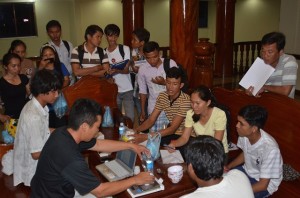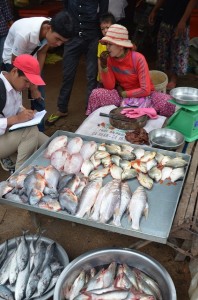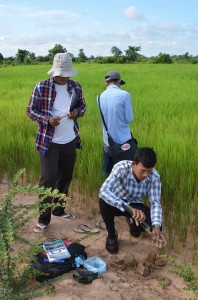
- This event has passed.
2nd Workshop on Interdisciplinary Field Work for Sustainable, Livelihood Studies
2014年8月18日 @ 8:00 AM - 2014年8月24日 @ 5:00 PM
Event Navigation
Date:18-24 9-10 August, 2014
Venue:Royal University of Agriculture
Organization:Royal University of Agriculture, Cambodia
Record of Activity: 2nd Workshop on Interdisciplinary Field Work for Sustainable, Livelihood Studies
Rural livelihoods in Southeast Asia are rapidly changing. While change is an important perspective in all parts of the region, Cambodia provides a good chance to learn from and observe changes at a country level. Furthermore, Pursat province, which has a rich diversity in biophysical and social environment such as lakeside fishery area along Tonle Sap Lake, lowland rice-growing area having towns and roads, and mountainous forest area receiving various migrants from lowland in recent years, is a good representative of rural Southeast Asia for the study of livelihood transition.
CSEAS had established MOU with Royal University of Agriculture (RUA) as well as Royal University of Fine Arts (RUFA) in December 2010. Since then, CSEAS has been organizing a series of collaborative programs with the faculty members and students of these institutions. In Pursat province, CSEAS organized “the first workshop on Interdisciplinary Field Work for Sustainable Livelihood Studies” in February 2013 with seven Japanese researchers and nineteen Cambodian students and faculty staffs from RUA and RUFA. The workshop aimed to explore livelihood transitions in rural communities in the area as well as to contribute toward the education of RUA and RUFA by giving instructions of research methodologies for young Cambodians.
 From 18th to 24th August 2014, five Japanese researchers; three from Kyoto University, one from Hannan University, one from Kochi University, and 17 Cambodian master course students and one faculty member of RUA conducted the second collaborative workshop in Pursat. After spent one day for kick-off meeting at RUA campus in Phnom Penh, the group moved to Pursat province and conducted three kinds of researches during five days: (1) Observation and analysis of diversity in rice-growing landscape, (2) Rice growth evaluation and cultivation patterns in lowland paddies, (3) Value chains of local fishes. Giving instructions to the Cambodian students was important purpose of this as the same as the previous workshop. The students formed three or four teams and conducted observations and interviews with Japanese researchers in daytime. They worked in nighttime as well for integrating collected data by each team and made PPT slides for result presentations.
From 18th to 24th August 2014, five Japanese researchers; three from Kyoto University, one from Hannan University, one from Kochi University, and 17 Cambodian master course students and one faculty member of RUA conducted the second collaborative workshop in Pursat. After spent one day for kick-off meeting at RUA campus in Phnom Penh, the group moved to Pursat province and conducted three kinds of researches during five days: (1) Observation and analysis of diversity in rice-growing landscape, (2) Rice growth evaluation and cultivation patterns in lowland paddies, (3) Value chains of local fishes. Giving instructions to the Cambodian students was important purpose of this as the same as the previous workshop. The students formed three or four teams and conducted observations and interviews with Japanese researchers in daytime. They worked in nighttime as well for integrating collected data by each team and made PPT slides for result presentations.
 Through the activities of this workshop, empirical data on rice growth and cultivation activities in Bakan district as well as trading of local fish in provincial capital and Bakan district had accumulated adequately. At the same time, the students leaned useful research methods such as analyzing information on topography map, determining a location by mobile GPS, and measuring content rate of ammonia in paddy soil.
Through the activities of this workshop, empirical data on rice growth and cultivation activities in Bakan district as well as trading of local fish in provincial capital and Bakan district had accumulated adequately. At the same time, the students leaned useful research methods such as analyzing information on topography map, determining a location by mobile GPS, and measuring content rate of ammonia in paddy soil.
Considering the reputation from Cambodian participants, CSEAS is planning to organize the 3rd workshop of Interdisciplinary Field Work for Sustainable Livelihood Studies in Pursat province in August 2015.
Kobayashi Satoru

